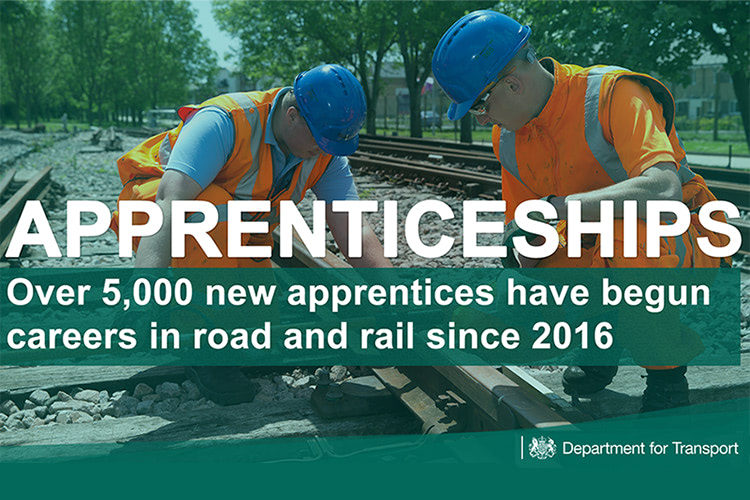Transport industry leading the way in apprenticeships

The transport industry is leading the way in unlocking brilliant careers and tackling the need for the engineers of the future, the Skills and Apprenticeships Minister set out today (July 19).
Commenting on the launch of industry’s ‘Transport Infrastructure Skills Strategy – Two Years On’ report, Transport Minister Nusrat Ghani welcomed the 2,784 apprenticeships created in road and rail in the past year. She also reaffirmed the government’s commitment to creating 30,000 apprenticeships in road and rail bodies and increased diversity of the transport workforce, with a strong focus on encouraging more women and Black, Asian and Minority Ethnic (BAME) people into the industry.
The report shows more than 5,000 apprentices have begun training in road and rail sectors alone since 2016, demonstrating how significant government and private investment into projects across the country is helping to unlock brand new careers, upskilling the workforce and supporting social mobility.
This year the report shows:
- an additional 8,000 opportunities will be created every year in the express delivery sector
- training places for maritime cadets will rise to 1,200 over the next seven years
- 10,000 apprenticeships as a result of an expanded Heathrow before 2030
Nusrat Ghani, Skills and Apprenticeships Minister, said:
“This report shows that significant government investment in transport is playing a key role in creating life-changing opportunities through its high quality apprenticeships – helping us lead the way in unlocking new jobs and ensuring this country has the skilled workforce it needs for the future.
“Although we are seeing evidence of better BAME representation in the sector, our ambitions are clear. From road to rail, maritime to aviation, we must all redouble our efforts to bring more women into technical and engineering roles, remove barriers, ensuring we bring talented people from all backgrounds together to tackle the skills gap.
“We are committed to strengthening links between employers in our sector and young people, particularly in the creative, innovative world of engineering through our Year of Engineering campaign. I look forward to even more apprentices starting brilliant careers in years to come.”
Mike Brown MVO, Commissioner, Transport for London and chair of STAT, said:
“The power of collaboration on skills from transport employers who are committed to creating more high quality skills and training opportunities for people of all ages has already provided great results across the sector.
“The increase in transport apprenticeships is vital to addressing current skills shortages, helping to fill gaps in future skills, improving productivity and driving growth in Britain for the future.”
The report highlights how the government and transport bodies, including Network Rail and Highways England are rising to the challenge of meeting demand, including:
- better quality apprenticeships, leading to highly skilled jobs, including working with Investors in People on quality standards for employers.
- supporting people already working in transport to gain new skills, as well as returners to the industry and those looking for a career change
- investment in jobs and skills written into contracts and rail franchise agreements
- driving greater diversity in the industry
- Identifying exactly where and when different jobs and skills will be needed working with schools to encourage routes into transport careers
DfT created the industry led taskforce – the Strategic Transport Apprenticeship Taskforce (STAT) – in 2016 to deliver many of the recommendations of the Transport Infrastructure Skills Survey. The Taskforce is Chaired by Mike Brown MVO, Commissioner, Transport for London.
The Year of Engineering 2018 is a cross-Government campaign led by the Department for Transport to inspire the next generation of engineers in the UK. The campaign objective is to widen the pool of young people who would consider engineering as a career to help address the engineering skills gap. It also aims to improve the diversity of the profession.










Responses